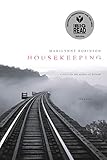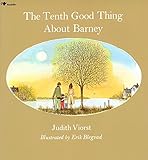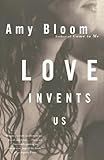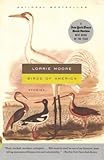 When I was 21, three weeks after I’d moved to San Francisco to live with my boyfriend Stephen, his lung collapsed on the way to a party. He was casual about it—he had cystic fibrosis, and though he’d only had one health crisis before this moment, he wasn’t surprised. I panicked and went into a coughing fit. The next morning, we headed over to the hospital at UCSF, and began the part of our life together for which there was no map. That evening, home alone, I wandered around our living room. We were sharing an apartment with two of Stephen’s friends, both English majors at Berkeley. I browsed through their books, looking for good end-of-the-night-on-the-day-your-life-has-changed reading. Unlike most of the books I’d brought with me from the University of Chicago, the books on these shelves were written by living authors. (I remember feeling jealous: my roommates had gotten to read these books for school?) I crawled in bed with a book my roommate Steve had raved about, Marilynne Robinson’s Housekeeping. In the morning, I woke up with the light still on, my face pressed into the book’s pages.
When I was 21, three weeks after I’d moved to San Francisco to live with my boyfriend Stephen, his lung collapsed on the way to a party. He was casual about it—he had cystic fibrosis, and though he’d only had one health crisis before this moment, he wasn’t surprised. I panicked and went into a coughing fit. The next morning, we headed over to the hospital at UCSF, and began the part of our life together for which there was no map. That evening, home alone, I wandered around our living room. We were sharing an apartment with two of Stephen’s friends, both English majors at Berkeley. I browsed through their books, looking for good end-of-the-night-on-the-day-your-life-has-changed reading. Unlike most of the books I’d brought with me from the University of Chicago, the books on these shelves were written by living authors. (I remember feeling jealous: my roommates had gotten to read these books for school?) I crawled in bed with a book my roommate Steve had raved about, Marilynne Robinson’s Housekeeping. In the morning, I woke up with the light still on, my face pressed into the book’s pages.

 Hospital time is funny—both heart-quickening and slow. You know you are at the center of life, that what’s happening right where you are matters, so you feel a constant sense of urgency, and at the same time, the hours themselves are vacation-like, stretching out long, not much to do. In the evenings when I visited Stephen, we’d lie on his bed, talking, watching movies, and reading. He didn’t want to read any of his favorite books in the hospital, on the grounds that they’d carry the aftertaste of the hospital once he got out. He stuck to magazines—the current issue of Rolling Stone, or something football-related. And there’s some truth to his theory—the characters and the landscape of Housekeeping are somehow connected to the hospital in my mind. But the reverse is true too, which was what made it worth reading the book while sitting in a beige chair eating chocolate pudding. The hospital became infused with Housekeeping. I looked forward to diving into its world those evenings. It offered an escape unattainable from a football magazine—or maybe escape is the wrong word—it offered a depth of experience that was part-escape, part-reckoning. The two sisters in its pages, whose mother had died, faced a loss much larger than any I’d ever gone through, but I was dipping my toe in, glimpsing the loss that likely lay in my future. And more, the story evoked a strange state that I was newly experiencing and had no words for—the sudden awareness of how little control I had over life, which left me both at sea and sharpened, helpless and purposeful. That hospital visit, which was longer than expected, I moved from Housekeeping to Beloved to A Personal Matter. And though these three books are so different that their authors might be surprised to see them all appear in the same sentence, they are linked in my mind, for the broad understandings they offered me of suffering and joy, and the complications of love.
Hospital time is funny—both heart-quickening and slow. You know you are at the center of life, that what’s happening right where you are matters, so you feel a constant sense of urgency, and at the same time, the hours themselves are vacation-like, stretching out long, not much to do. In the evenings when I visited Stephen, we’d lie on his bed, talking, watching movies, and reading. He didn’t want to read any of his favorite books in the hospital, on the grounds that they’d carry the aftertaste of the hospital once he got out. He stuck to magazines—the current issue of Rolling Stone, or something football-related. And there’s some truth to his theory—the characters and the landscape of Housekeeping are somehow connected to the hospital in my mind. But the reverse is true too, which was what made it worth reading the book while sitting in a beige chair eating chocolate pudding. The hospital became infused with Housekeeping. I looked forward to diving into its world those evenings. It offered an escape unattainable from a football magazine—or maybe escape is the wrong word—it offered a depth of experience that was part-escape, part-reckoning. The two sisters in its pages, whose mother had died, faced a loss much larger than any I’d ever gone through, but I was dipping my toe in, glimpsing the loss that likely lay in my future. And more, the story evoked a strange state that I was newly experiencing and had no words for—the sudden awareness of how little control I had over life, which left me both at sea and sharpened, helpless and purposeful. That hospital visit, which was longer than expected, I moved from Housekeeping to Beloved to A Personal Matter. And though these three books are so different that their authors might be surprised to see them all appear in the same sentence, they are linked in my mind, for the broad understandings they offered me of suffering and joy, and the complications of love.


 After that first health scare, Stephen and I lived a double existence. He was healthy for the most part, and we were kids in our 20s like the rest of our friends, and yet we knew he’d be lucky to live until he was 35, so we were sort of in our 80s, too. It was an unusual existence—no one we knew had gone through it—and you’d think this would have sent me straight to the psychology section, or at least the illness memoir section, of the bookstore where I worked. But the closest I ever got to reading a book that directly addressed my circumstances was when I braved the “issues” shelf in the children’s section, and picked up The Tenth Good Thing about Barney by Judith Viorst, in which a family grieves over the death of their cat. It was partly denial, but it was also the same force that had driven me to fiction since I was kid—I didn’t want to read about my own life. I spent enough time in my own life—I wanted to read about all the lives that I’d never have. Though occasionally, a glimpse of my own life snuck in without my asking. I remember reading The Sheltering Sky, and feeling my stomach drop when the main character dies halfway through the book, and his wife takes over the story. I also remember reading Jack Kerouac Is Pregnant by Aurelie Sheehan, thinking, yes, I know that feeling, Kerouac but tied down, the road trip and the responsibilities all taking place at once.
After that first health scare, Stephen and I lived a double existence. He was healthy for the most part, and we were kids in our 20s like the rest of our friends, and yet we knew he’d be lucky to live until he was 35, so we were sort of in our 80s, too. It was an unusual existence—no one we knew had gone through it—and you’d think this would have sent me straight to the psychology section, or at least the illness memoir section, of the bookstore where I worked. But the closest I ever got to reading a book that directly addressed my circumstances was when I braved the “issues” shelf in the children’s section, and picked up The Tenth Good Thing about Barney by Judith Viorst, in which a family grieves over the death of their cat. It was partly denial, but it was also the same force that had driven me to fiction since I was kid—I didn’t want to read about my own life. I spent enough time in my own life—I wanted to read about all the lives that I’d never have. Though occasionally, a glimpse of my own life snuck in without my asking. I remember reading The Sheltering Sky, and feeling my stomach drop when the main character dies halfway through the book, and his wife takes over the story. I also remember reading Jack Kerouac Is Pregnant by Aurelie Sheehan, thinking, yes, I know that feeling, Kerouac but tied down, the road trip and the responsibilities all taking place at once.
 By the time we were 27, Stephen’s health had begun a dangerous decline. We were living in Cambridge, where he was attending grad school, and we had to admit that we couldn’t pretend to be normal anymore—he needed to quit school and get on the list for a double-lung transplant. At that time, the risks of a transplant were huge, as were the possibilities. If Stephen survived, his lungs would be free of CF for the rest of his life. But the operation was at the cutting edge of modern medicine—half of the people who underwent the surgery died in the first five years. It was a big decision, and we made it together (so sweet, Stephen’s doctor joked, young couples, deciding on everything together—the couch, the kitchen table, the transplant). We packed everything we owned into our 1976 green Volvo and headed back to California to make this next move. This was the first time I ached for nonfiction, for someone who’d been there ahead of me to tell me what to do, or if not that, how to go about living with the unknown. My friend Caitlin was a poet and she gave me Mark Doty’s Heaven’s Coast. I recently looked back in my journal from that time, and there are pages devoted to notes for the letter I planned to write to Doty after reading his book. (I never got around to writing the actual letter.) Reading them now I feel a little embarrassed. Why would this stranger want to know about all the small and large ways I felt connected to him? And yet I did—more so than I did to the other partners of transplant patients, even to our friends and family who loved me dearly. He’d written intimately about his life with his partner who’d died of AIDS, offering observations that you’d never hear buzzing around a support group, admitting feelings and thoughts I shared but had hardly admitted to myself, much less to Stephen. I was grateful for Heaven’s Coast in a way I can still feel, even though it’s been over 15 years.
By the time we were 27, Stephen’s health had begun a dangerous decline. We were living in Cambridge, where he was attending grad school, and we had to admit that we couldn’t pretend to be normal anymore—he needed to quit school and get on the list for a double-lung transplant. At that time, the risks of a transplant were huge, as were the possibilities. If Stephen survived, his lungs would be free of CF for the rest of his life. But the operation was at the cutting edge of modern medicine—half of the people who underwent the surgery died in the first five years. It was a big decision, and we made it together (so sweet, Stephen’s doctor joked, young couples, deciding on everything together—the couch, the kitchen table, the transplant). We packed everything we owned into our 1976 green Volvo and headed back to California to make this next move. This was the first time I ached for nonfiction, for someone who’d been there ahead of me to tell me what to do, or if not that, how to go about living with the unknown. My friend Caitlin was a poet and she gave me Mark Doty’s Heaven’s Coast. I recently looked back in my journal from that time, and there are pages devoted to notes for the letter I planned to write to Doty after reading his book. (I never got around to writing the actual letter.) Reading them now I feel a little embarrassed. Why would this stranger want to know about all the small and large ways I felt connected to him? And yet I did—more so than I did to the other partners of transplant patients, even to our friends and family who loved me dearly. He’d written intimately about his life with his partner who’d died of AIDS, offering observations that you’d never hear buzzing around a support group, admitting feelings and thoughts I shared but had hardly admitted to myself, much less to Stephen. I was grateful for Heaven’s Coast in a way I can still feel, even though it’s been over 15 years.
 Still, in the eye of the storm, when the midnight call for the transplant came, I reached for fiction. Packing hurriedly for the hospital I grabbed Amy Bloom’s Love Invents Us and Ethan Canin’s Blue River. The adrenaline rush of the day of surgery, the euphoria of seeing Stephen breathe with new lungs, it was all mixed up with the stories I read, sitting by his bed. Usually when I read, the story I’m devouring is more dramatic than the events of my own life, but for those weeks, the lives in my books felt calmer and slower than my own, digestible, the authors offering subtle reflections on complicated relationships when there wasn’t room for me to do any reflecting myself. And somehow this allowed me to slow down, too, to sink into the daily events of the transplant a bit. Even if I couldn’t quite reflect, I could observe, and this in itself made the days less harrowing.
Still, in the eye of the storm, when the midnight call for the transplant came, I reached for fiction. Packing hurriedly for the hospital I grabbed Amy Bloom’s Love Invents Us and Ethan Canin’s Blue River. The adrenaline rush of the day of surgery, the euphoria of seeing Stephen breathe with new lungs, it was all mixed up with the stories I read, sitting by his bed. Usually when I read, the story I’m devouring is more dramatic than the events of my own life, but for those weeks, the lives in my books felt calmer and slower than my own, digestible, the authors offering subtle reflections on complicated relationships when there wasn’t room for me to do any reflecting myself. And somehow this allowed me to slow down, too, to sink into the daily events of the transplant a bit. Even if I couldn’t quite reflect, I could observe, and this in itself made the days less harrowing.
 I reached for fiction again when Stephen went into the hospital for the last time. I didn’t know it was the last time right away, but he’d landed in the ICU with a ventilator, which was as worrisome as things had ever been. I’d been reading Birds of America by Lorrie Moore, so I brought it along, and sank deep into the stories that first morning, sitting by Stephen’s bed, waiting for him to wake up so we could decide whether we needed to call our families. I read for two hours straight, and kept laughing out loud. A nurse asked me to write down the name of the book for her. She didn’t care what it was about. “If it’s got you laughing in the ICU,” she said, “I have to read it.”
I reached for fiction again when Stephen went into the hospital for the last time. I didn’t know it was the last time right away, but he’d landed in the ICU with a ventilator, which was as worrisome as things had ever been. I’d been reading Birds of America by Lorrie Moore, so I brought it along, and sank deep into the stories that first morning, sitting by Stephen’s bed, waiting for him to wake up so we could decide whether we needed to call our families. I read for two hours straight, and kept laughing out loud. A nurse asked me to write down the name of the book for her. She didn’t care what it was about. “If it’s got you laughing in the ICU,” she said, “I have to read it.”

 When Stephen died three weeks later, I was reading Platte River by Rick Bass. And while soon I’d read C.S. Lewis’s A Grief Observed, and find deep, specific solace in its pages, I also found solace in Platte River, if less personal, maybe more expansive, too—an acknowledgment of the mysteries in living, of all that we can’t know. It was partly the characters in Platte River, with their bottomless and invisible longings that drew them together and kept them apart, set against the sudden hole in my own life. And it was partly the landscape of Montana, both physically and personally too large for any frame. Montana was the place where my father’s family was from, holding everything I’d never know about his childhood, his parents, why certain family events unfolded the way they did. And its sky and plains were coldly soothing, as endless as the ocean, and offering a similar sort of comfort, with their indifference to my own ups and downs.
When Stephen died three weeks later, I was reading Platte River by Rick Bass. And while soon I’d read C.S. Lewis’s A Grief Observed, and find deep, specific solace in its pages, I also found solace in Platte River, if less personal, maybe more expansive, too—an acknowledgment of the mysteries in living, of all that we can’t know. It was partly the characters in Platte River, with their bottomless and invisible longings that drew them together and kept them apart, set against the sudden hole in my own life. And it was partly the landscape of Montana, both physically and personally too large for any frame. Montana was the place where my father’s family was from, holding everything I’d never know about his childhood, his parents, why certain family events unfolded the way they did. And its sky and plains were coldly soothing, as endless as the ocean, and offering a similar sort of comfort, with their indifference to my own ups and downs.
 Still, when I’m grappling with my life, I reach for fiction. In the years of emerging from grief, of falling in love and marrying again, of having kids and being a part of several families cobbled together, I’ve been up late with The Deptford Trilogy and A Gathering of Old Men, with The Sea, the Sea, and Olive Kitteridge and Sum. I am lost in worlds far from mine, and yet grateful for what they tell me about my own life, too—that it’s only a variation on a theme, that maybe it’s unusual to lose your first husband at 29, but so what—love and loss and grief and more love are out there for all of us, unremarkable in the human scheme of things.
Still, when I’m grappling with my life, I reach for fiction. In the years of emerging from grief, of falling in love and marrying again, of having kids and being a part of several families cobbled together, I’ve been up late with The Deptford Trilogy and A Gathering of Old Men, with The Sea, the Sea, and Olive Kitteridge and Sum. I am lost in worlds far from mine, and yet grateful for what they tell me about my own life, too—that it’s only a variation on a theme, that maybe it’s unusual to lose your first husband at 29, but so what—love and loss and grief and more love are out there for all of us, unremarkable in the human scheme of things.
Image credit: Flickr/erikccooper.










